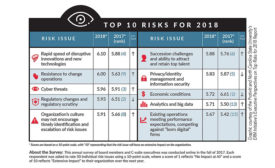Security Leadership and Management
Mitigating the Insider Threat: Boeing's Successful Approach
Why you need an insider threat program, and 10 steps to help you to establish one
February 1, 2018
Sign-up to receive top management & result-driven techniques in the industry.
Join over 20,000+ industry leaders who receive our premium content.
SIGN UP TODAY!Copyright ©2024. All Rights Reserved BNP Media.
Design, CMS, Hosting & Web Development :: ePublishing










